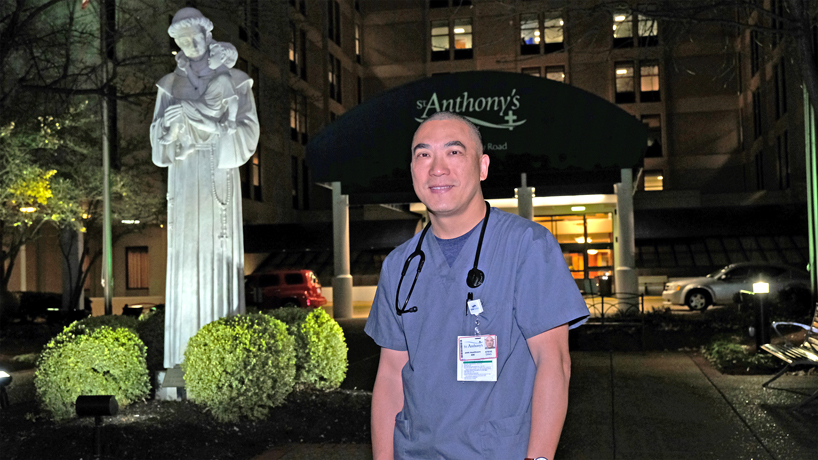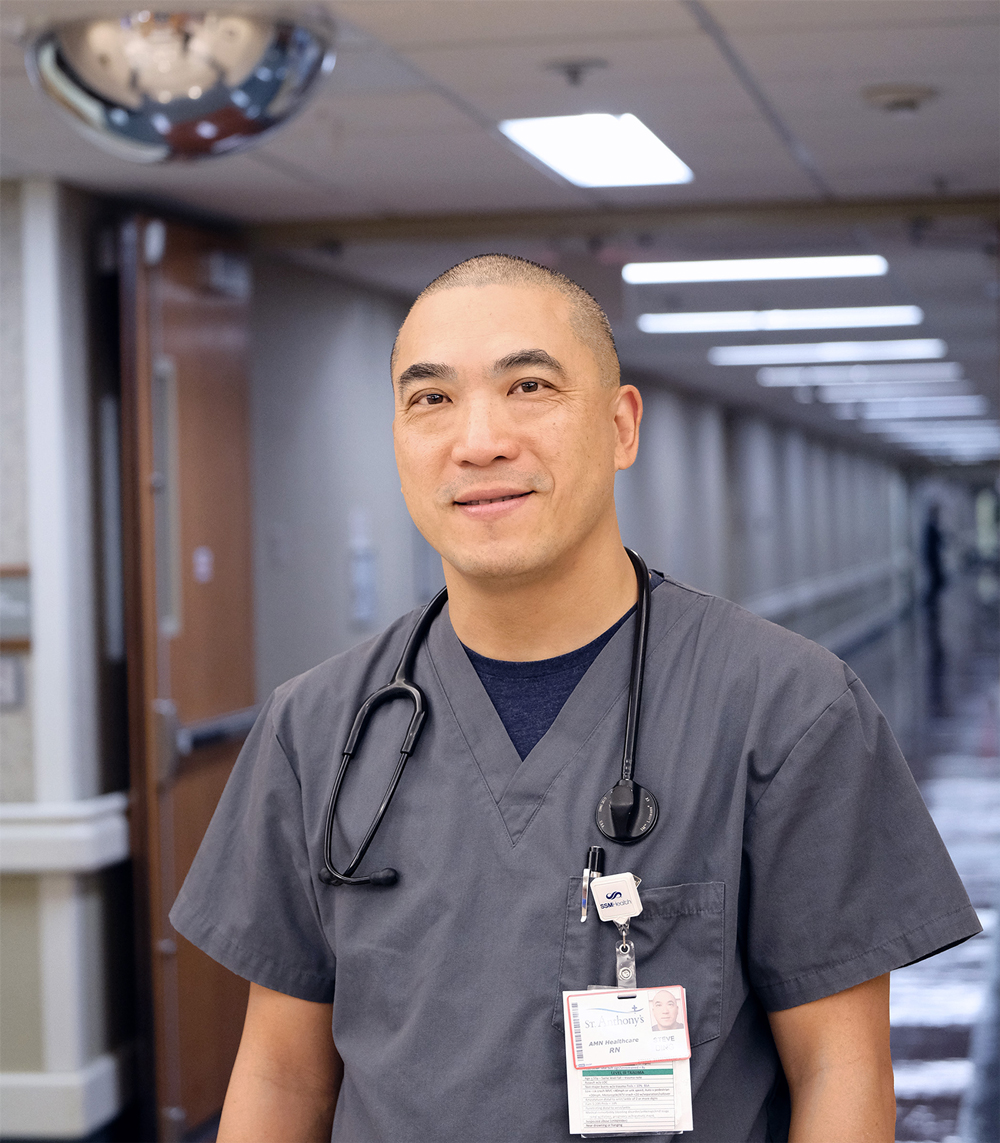
Steve Ding, BSN 2013, enjoys some fresh air shortly before his 12-hour night shift at St. Anthony’s Medical Center in St. Louis. His position as a travel emergency room nurse for American Mobile Healthcare has him stationed there for now until a different ER needs additional nurses. (Photos by August Jennewein)
Before Steve Ding became a nurse, he ran NetDetail, a former information technology solutions business in St. Louis, for almost 15 years.
The University of Missouri–St. Louis nursing alumnus had been a chief software architect who built website applications and designed software for clients. Most notably Ding created Clinical Desktop for BJC HealthCare and a record system called electronic Child Health Network for medical professionals in Ontario.
But in 2009, he ditched his tech career.
“I wanted to do something more meaningful,” said Ding, who had attended Winona State University to study computer science before working at NetDetail. “I wanted to really help people.”
Originally from Shanghai, Ding said his giving nature stems from his culture. He moved here at 19 to go to school and felt ready to get back to serving others.
“Growing up in China, it’s just kind of what we do,” he said.

In a hallway at St. Anthony’s Medical Center, Ding poses by the dome mirror, which has become a simple but vital item of his nursing career. Every night he uses it to check around the corner to be sure the hallway is clear as they wheel patients quickly around the ER.
That eventually led Ding to the idea of nursing and drove him to enroll in the College of Nursing’s 15-month accelerated BSN program in 2013. But his first experiences in the health field actually came as a disaster volunteer trained by the American Red Cross while he was still at NetDetail.
Ding has volunteered for the Red Cross for almost 10 years now.
“It’s hard to recruit in a natural disaster,” he said. “They’re always looking for medical professionals, doctors and nurses, to aid those people, especially seniors and children, with medical needs.”
Ding has responded to some of Missouri’s worst disasters, including the 2011 tornado that struck St. Louis Lambert International Airport and the 2015 winter flooding in the St. Louis region. He’s helped run numerous shelters and feeding operations, but Ding said about 90 percent of disasters he’s called to are local fires.
“The first 48 to 72 hours are the most critical time,” he said. “Families face not having the financial resources to address immediate needs, from paying for a hotel to meals. We help with being sure they have those basic needs met and also provide them medical and psychological support.”
While volunteering, Ding became a licensed emergency medical technician and began work as a paramedic for Abbott EMS the same year he started the accelerated BSN program at UMSL.
“It allowed me to work part time and go to school,” he said. “It also came highly recommended from previous graduates, and I knew of UMSL’s reputation as a top nursing program in St. Louis.”
Ding’s nursing degree segued into a position as a staff nurse in the emergency room at SSM Health DePaul Hospital, where his Red Cross experience with intense emergency situations helped.
“I’m used to that high-pressure pace in emergency departments,” Ding said, “and the cases that come in vary. From illness to trauma, you learn a lot of different things, and in the long run it makes you a better nurse.”
He’s since moved on to become a travel emergency room nurse for American Mobile Healthcare. The company addresses regional imbalance of nursing staff. Some hospitals may have surplus ER nurses while others are shorthanded. American Mobile Healthcare serves as the middleman that connects nurses with hospitals in need of more helping hands.
Even with a demanding job, Ding still finds time to continue his volunteering – and not only with Red Cross. He regularly helps with the local Muscular Dystrophy Association camp to which Assistant Teaching Professor Beth Dudley introduces her students. Ever since his UMSL days, he’s had continued involvement in the camp.
“It’s like Christmas for those children, who often are the only kid with a disability in their class,” Ding said. “For a week, they get to enjoy a summer camp funded 100 percent by donations, and they are matched with a counselor to help them with activities. It’s such a big deal, and they make a lot of friends that relate to them.”
Ding also volunteers at the Salam Free Clinic, located in a Christian church in Ferguson, Missouri. He helps the doctors provide accessible health care to uninsured and underinsured patients.
Ding plans to continue travel nursing and hopes one day to provide mobile health care via a recreational vehicle.















